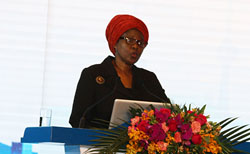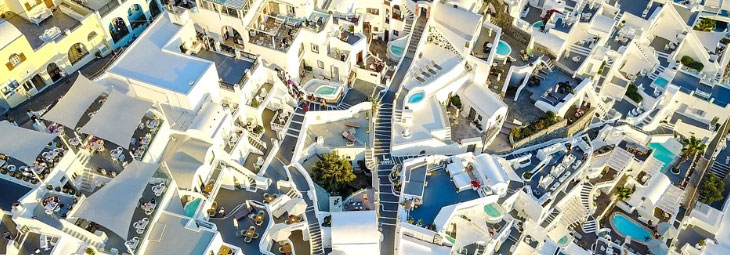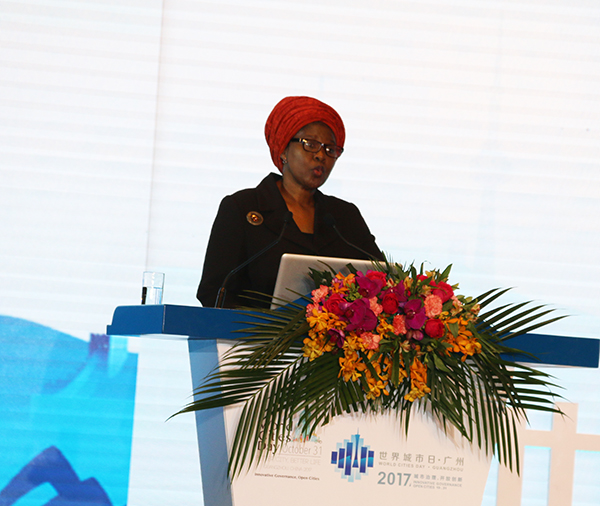



Honourable Moderator and Vice-Minister of Housing and Urban-Rural Development of the People’s Republic of China, Mr NI Hong
Distinguished guests, Ladies and gentlemen
It is truly a great honour to have been invited to participate at this auspicious event today, more so in the presence of:
His Excellency the Minister of Housing and Urban-Rural Development of the People’s Republic of China, Mr WANG Menghui,
His Excellency the Secretary-General of the United Nations, Mr Antonio Guterres,
Executive Director of UN-Habitat, Dr Joan Clos
Mayor of Guangzhou city, Mr WEN Guohui
It gives me great pleasure to join the esteemed participants, the auspicious audience and the world in celebrating the World Cities Day 2017, which has been designated by the United Nations every 31 October.
The dynamic and cosmopolitan city of Guangzhou, is a most fitting venue to host this year’s celebration, situated in a country that has developed a network of cities and mega cities, in the most incredible manner yet seen in this millennium.
I believe that Guangzhou will provide the right atmosphere for this Forum to further the goals of World Cities Day: to promote the international community’s interest in global urbanisation, and to foster cooperation among countries in contributing to sustainable urban development around the world, particularly the role of cities as a source of global development and social inclusion.
Ladies and gentlemen, throughout the world, cities are growing at an exponential rate. They are becoming bigger, denser, more high tech and sophisticated, alluring, convenient and ultimate places of abode. However our ‘amazing cities’ also present very challenging and depressing circumstances.
Which is why the main theme for the 2017 World Cities Day: ‘Innovative Governance, Open Cities’ is appropriate and enables us to harness the beauty and goodness of urban life and at the same time deal with challenges to ensure sustainable urban development.
I believe that this year’s theme is embraced by the action and implementation of the New Urban Agenda, which puts the topic of inclusive cities as one of the main pillars of the urban shift.
Cities represent the most promising sites for governance reforms and innovation to tackle rising inequality, intensifying environmental stress and vulnerability, the continued economic crisis, increasing conflict and unprecedented technological opportunity.
South African Cities, like other World Cities, are presented with incredible opportunities on one hand and besieged by high levels of inequality on the other, and this has pushed to the fore, the critical role of sustainable urban development.
The South African government has thus prioritised assisting municipalities to become smart cities and fully grasp the challenges and opportunities presented by urbanisation. Municipalities are also encouraged to develop their own capacities to innovate, share best practices and knowledge management.
We are convinced that access to adequate housing is not only a basic human right, but it is also a socio-economic right upon which a functional and normal society is built. In this regard, our government is determined to fully meet the Constitutional right of all citizens to have access to adequate housing, especially the indigent.
Another important milestone for the country is to rapidly overcome apartheid spatial development patterns and to transform settlements spatial orientation through implementation of human settlements projects that are large-scale, multi-use, mixed-income in good locations with set expectations and time frames.
South Africa takes pride in her participation and contribution to global local governance. Last year the national chairperson of the South African Local Government Association (SALGA) and former-Mayor of Johannesburg, Mr Parks Tau, was elected to the Presidency of the United Cities and Local Government (UCLG), the global representative voice of organised local government.
As you might be aware, UCLG is a significant player on the global stage and is poised to become even more important in relation to the implementation of the Sustainable Development Goals 2030.
Ladies and gentlemen
I would like to conclude by expressing a wish that one day Sustainable Development Goal 11: which formulates the ambition to make cities and human settlements inclusive, safe, resilient and sustainable - is escalated to a point where it is NOT just an ambition but is set as a “minimum standard of living for cities’ and gains worldwide recognition and enforcement like “the ILO minimum wage rate”
I wish that the 2017 World Cities Forum be both productive and successful.
Siyabonga! Thank you! Xie Xie Da Jie!